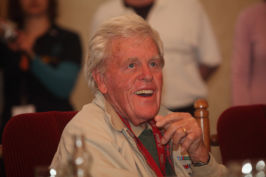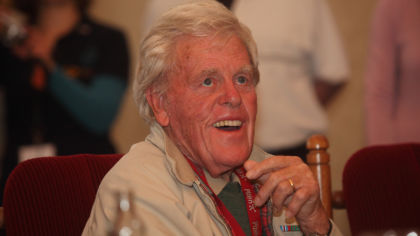Karl R. Lindquist
Christmas at the “Bulge”
Karl R. Lindquist, 26th Infantry Division
Sitting in a small café, in the shadow of the great Cathedral of Metz, Tom Mullins and I were having a beer and savoring the idea of an assigned one month rest period. What luxury! There would be hot meals and bunks to sleep on in the old French garrison that the enemy had been forced to evacuate. The Germans had hurriedly withdrawn from the city, leaving it pretty much intact. After three months on the front lines of General Patton’s 3rd Army, I had outlived the normal life expectancy of a first scout with G Company and had been reassigned to the 104th Infantry Regiment, 2nd Battalion, Medical Unit where Tom and I were medics. As such, we were not subject to the drills and crap inflicted on regular soldiers. We were free and intended to enjoy every minute of it. This was a dream come true, after the past intense months as first scout.
The dream ended abruptly with the arrival of a burly sergeant shouting out, “Listen up you guys. This is an order. Report back to your units – immediately!” Nothing more, but it didn’t sound good. Back at Medical Headquarters, we were told to pack up, as we would be moving out the next morning. There was some sketchy news of a German breakthrough some distance north of us, but nothing suggested the enormity of what was really happening. At 0600, the next day, December 22, we were loaded onto uncovered trucks. The day was bitterly cold – so cold that the steel truck bed sucked your body heat right through the soles of your shoes – so cold that it brought tears to my eyes. I suffered silently amidst this group of strangers in my newly assigned company.
After a couple of hours of rolling along, the line of trucks came to a stop and we started walking single file along the side of the road, which led through a lightly forested area covered with a dusting of snow. At one point, word came up from behind me, “The General’s coming.” I turned my head just in time to catch a glimpse of General Patton passing by. He was unmistakable as he stood at attention in the front of his Jeep, holster on his hip, one hand on the top of the windshield and the other in a salute to us. That turned out to be the only time I ever saw him, and it was a thrill!
We continued along the road, the 2nd Battalion in the lead, until we met the Germans coming down the same road in the opposite direction. We stopped dead and so did they. Word came that there was a wounded man at the head of the line, and I was picked up by a medical Jeep and moved forward. We were stopped before a bend in the road and told only that the wounded soldier was in the road around the corner – nothing else. Mullins and I grabbed the litter, headed down the road and, sure enough, he was lying there. He was still alive, so we got him on the litter and headed back. The whole thing seemed a little spooky – the Jeep being stopped, the company staying back around the corner, sending us out on our own. It all came out when we passed back through the company. The sergeant in charge said very quietly to me, “You guys have got a lot of guts, going out in front of that tank like that.” I said nothing – I hadn’t even seen the tank. I’ve often wondered if he saw us and allowed us to pick up the wounded – I like to think that.
It wasn’t until a few days later that we finally learned what was happening. The Germans had mounted a counteroffensive with their crack troops, against a thinly-manned section of our lines and ripped out a great, fifty-mile deep triangle of Allied-held territory. We, of the Third Army, had been sent north to squeeze shut the southern side of this “bulge” and relieve the surrounded 101st Airborne Division at Bastogne. Christmas Day arrived during a very quiet time for my battalion. We were treated to a hot turkey dinner with “all the trimmings”, in the field, with the Chaplin holding a brief service. I spent part of the day dressing the wounds of the captured or surrendered German soldiers, while talking to them in my high school German. They were a pathetic lot, older men as well as younger ones – even younger than I, at nineteen. These were not the crack troops that had spearheaded the drive, but the remnants of German manhood – thrown in, in a desperate attempt to hold the line. They had no stomach for war and were happy to be out of it. I could empathize with that.
From book 500 hours to victory

